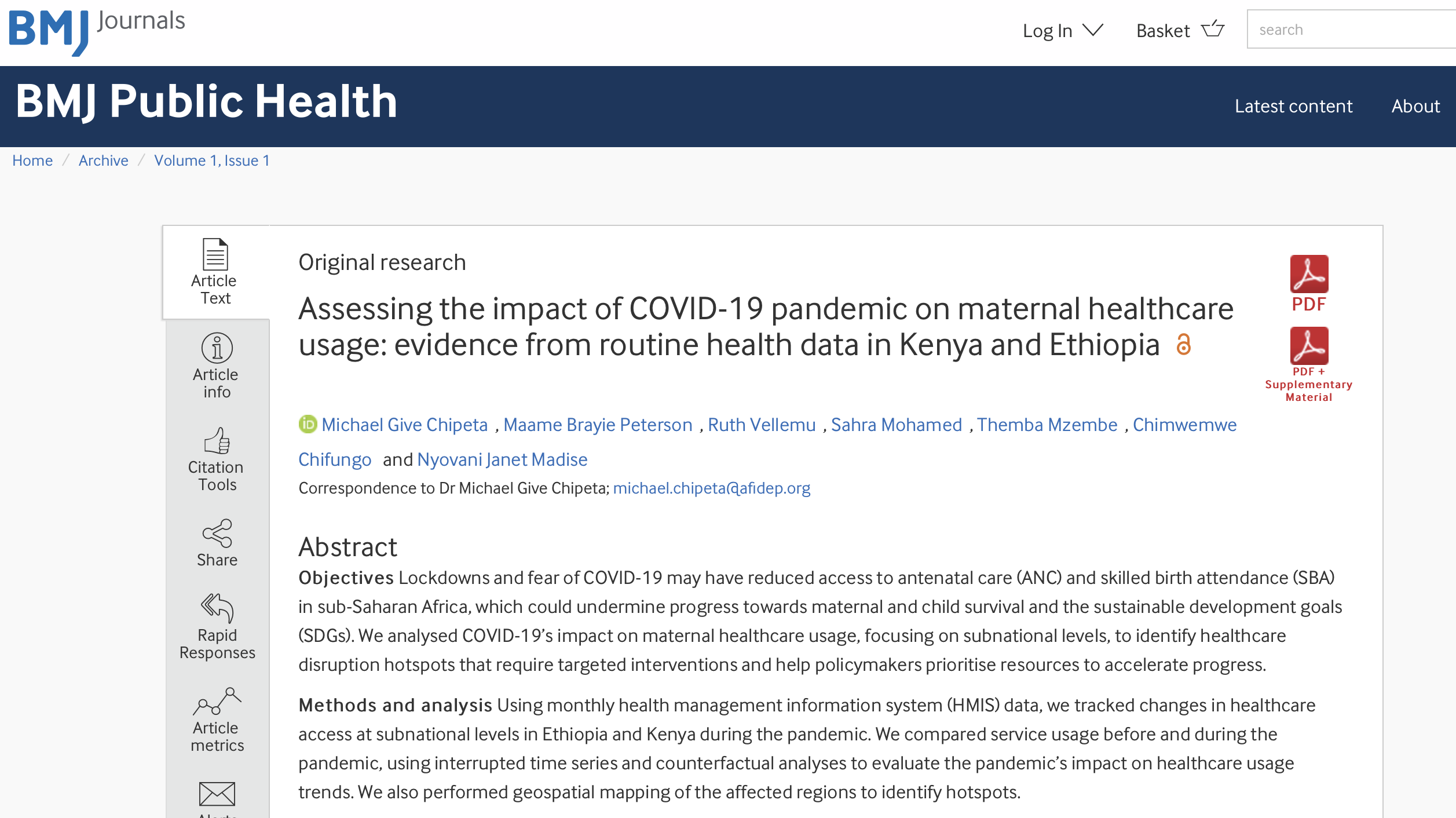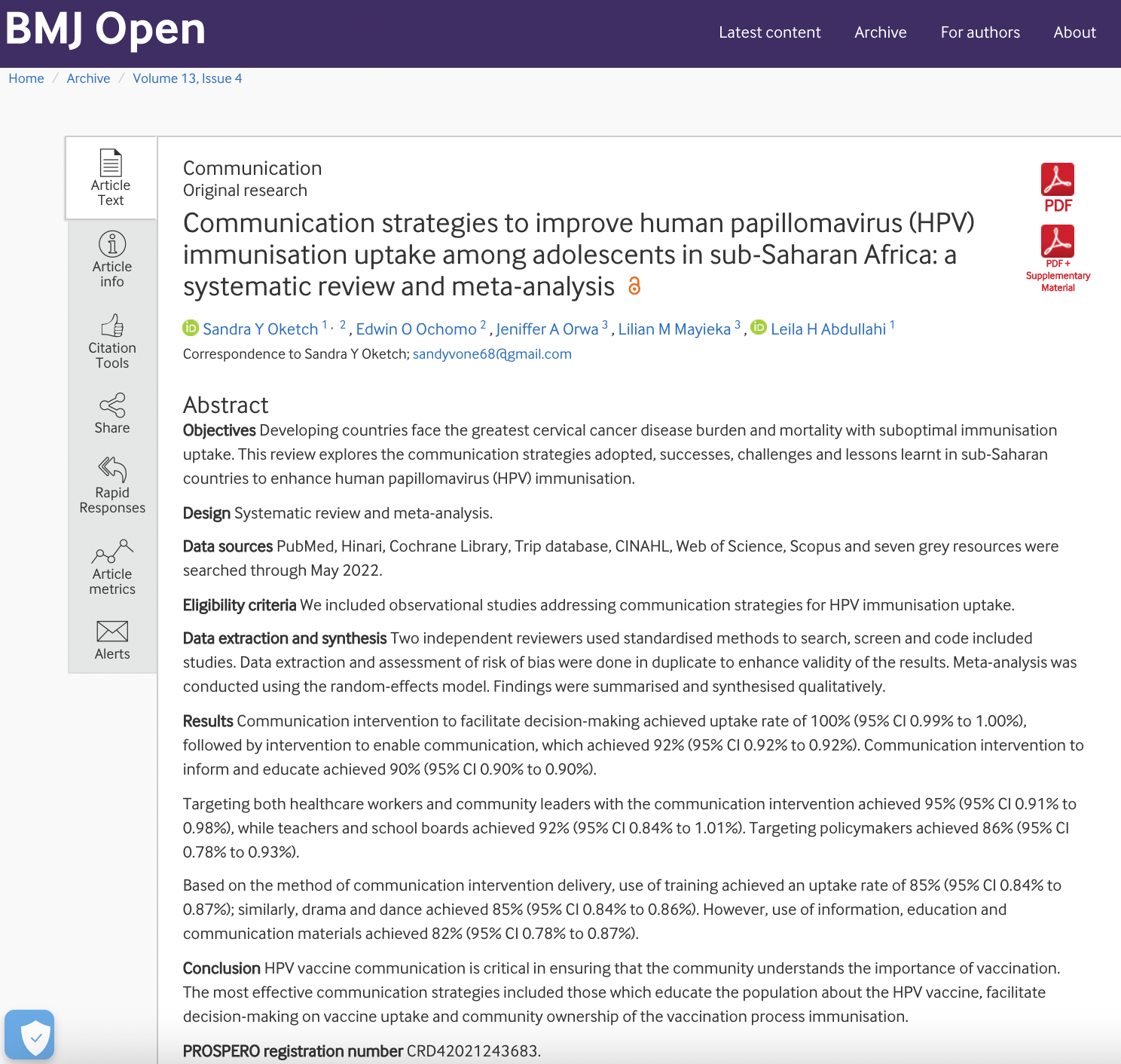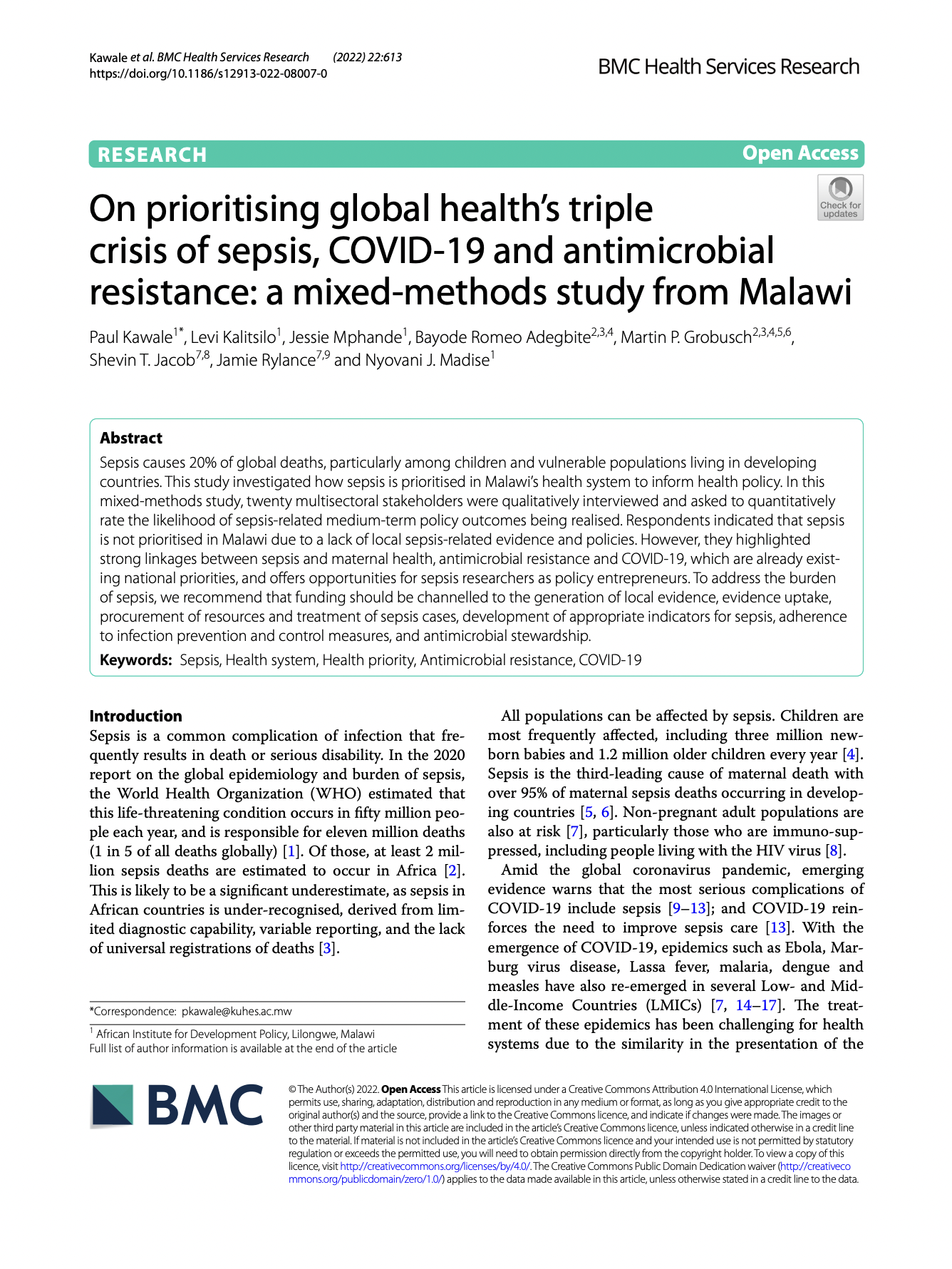Journal Articles

The devastating impacts and lessons learnt from other epidemic contexts show that health systems in low-income and middle-income countries (LMICs) and fragile and humanitarian contexts have a low capacity to implement an emergency response during disease outbreaks such as the COVID-19 pandemic caused by the SARS-CoV-2 virus.1 2 Such unprecedented emergency and humanitarian situations burden health systems, which, even before the disease outbreak, have struggled to provide quality essential services. Very few studies have demonstrated how COVID-19 affects progress towards achieving sustainable development goals (SDGs), especially SDG number 3 in countries including Kenya and Ethiopia. In this study, we assessed […]
Determinants of causes of death among Women of Reproductive Age (WRA) are complex and cut across distal and proximate factors but not intermediate factors. There is therefore, the need to expand the scope of the intermediate variables in future studies. In addition, marital status is a key determinant of the causes of death among WRA in the Kintampo North Municipality and Kintampo South District during the study period. Authors: Sulemana Watara Abubakari, Nurudeen Alhassan, Robert Adda, Kwaku Poku Asante and ayaga Agula Bawah Full Text Link: https://www.tandfonline.com/doi/full/10.1080/27707571.2022.2109300
Many young women experience important key life transitions during adolescence and early adulthood, such as initiation of sexual activity, first use of contraceptives, marriage, and childbirth. For young women to be able to plan and manage their lives, it is critical to understand how these life events intersect and shape their contraceptive decision-making. This study explored young women’s contraceptive method use trajectories, including the factors that influence contraceptive decision-making throughout adolescence and youth. Authors: Lisa M Calhoun, Mahua Mandal, Bernard Onyago, Erick Waga, Courtney McGuire, Eliya M Zulu, Thomas van den Akker, lenka Benova, Therese Delvaux, Ilene S Speizer Full […]
Household overcrowding is a serious public health threat associated with high morbidity and mortality. Rapid population growth and urbanisation contribute to overcrowding and poor sanitation in low-income and middle- income countries, and are risk factors for the spread of infectious diseases, including COVID-19, and antimicrobial resistance. Many countries do not have adequate surveillance capacity to monitor household overcrowding. Geostatistical models are therefore useful tools for estimating household overcrowding. This study, aimed to estimate household overcrowding in Africa between 2000 and 2018 by combining available household survey data, population censuses, and other country-specific household surveys within a geostatistical framework. Authors: Michael G […]
Results of this study demonstrate that both individual and contextual factors are important in determining factors influencing use of Antenatal Care. The results also showed very strong spatial variation in the timing of first antenatal visit, frequency of use as well as access to the nearest health facility across the country. Any planning to promote the use of health care must be programmed to enhance both targeted interventions for improved health care and for accelerated achievement of sustainable development goal number 3. Authors:Ellen Gondwe, Michael G. Chipeta & Lawrence Kazembe Full Text Link: https://link.springer.com/chapter/10.1007/978-3-031-11012-2_10
This work addresses important questions about the practical implementation of post-TB services in two African countries, exploring if, how, where, and for whom these services should be provided, according to a broad range of stakeholders. We have identified strong interest in the provision of holistic care for TB patients in Kenya and Malawi, and key evidence gaps which must be addressed to inform decision making by policy makers, TB programmes, and funders around investment in post-TB services. There is a need for pilot studies of models of integrated TB care, and for cross-learning between countries and from HIV-NCD services. Authors: […]
Sepsis causes 20% of global deaths, particularly among children and vulnerable populations living in developing countries. This study investigated how sepsis is prioritised in Malawi’s health system to inform health policy. In this mixed-methods study, twenty multisectoral stakeholders were qualitatively interviewed and asked to quantitatively rate the likelihood of sepsis-related medium-term policy outcomes being realised. Respondents indicated that sepsis is not prioritised in Malawi due to a lack of local sepsis-related evidence and policies. However, they highlighted strong linkages between sepsis and maternal health, antimicrobial resistance and COVID-19, which are already existing national priorities, and offers opportunities for sepsis researchers […]
The global challenge of evidence-informed policy-making in health is perpetuated by the gap between researchers and policy-makers.1 2 Knowledge translation (KT) addresses this gap by promoting interactions that encourage policy-makers’ responsiveness to research and researchers to conduct policy-relevant research.3 The WHO supports global KT efforts through the Evidence-informed Policy Network that encourages countries to establish KT platforms (KTPs).4 For example, platforms such as immunisation advisory groups have been instrumental in influencing immunisation country policy changes through evidence promotion.5 Specific to vector control (VC), the WHO developed the Global Vector Control Response to guide the implementation of VC through stakeholder integration and evidence-use.6 This paper […]
This study adds to the body of evidence regarding malaria prevention in rural community settings and promotes community buy-in to interventions. The study showed that the community-led HI resonated positively amongst the population in the rural area of Chikwawa in Malawi. Community-led HI implementation improved the community’s knowledge on HI and malaria. Participants perceived that HI had contributed to reducing the burden of malaria in the area. Acceptability of the intervention was reported to be high by participants. However, barriers towards implementation, such as heat and lack of ventilation in the HI house, inaccessibility, and affordability of materials, would make […]
This study was part of a 3-year (October 2019–October 2022) project called The Heightening Institutional Capacity for Government Use of Health Research (HIGH-Res) conducted in Kenya, Malawi and Uganda. The study was implemented to test interventions that strengthen the capacity of TWGs in enabling a sustained evidence use culture in the MoHs. This study focused on TWGs within the Ministry of Health (MoH) in Malawi, categorized as a low-income country in sub-Saharan Africa. The Ministry is responsible for developing, reviewing and enforcing health-related policies and standards for the health sector. The MoH performs its functions through 14 directorates, including a […]

HPV vaccine communication is critical in ensuring that the community understands the importance of vaccination. The most effective communication strategies included those which educate the population about the HPV vaccine, facilitate decision-making on vaccine uptake and community ownership of the vaccination process immunisation. Authors: Sandra Y Oketch, Edwin O Ochomo, Jeniffer A Orwa, Lilian M Mayieka, Leila H Abdullahi Full-Text Link: https://bmjopen.bmj.com/content/13/4/e067164

Sepsis causes 20% of global deaths, particularly among children and vulnerable populations living in developing countries. This study investigated how sepsis is prioritised in Malawi’s health system to inform health policy. In this mixed-methods study, twenty multisectoral stakeholders were qualitatively interviewed and asked to quantitatively rate the likelihood of sepsis-related medium-term policy outcomes being realised. Respondents indicated that sepsis is not prioritised in Malawi due to a lack of local sepsis-related evidence and policies. However, they highlighted strong linkages between sepsis and maternal health, antimicrobial resistance and COVID-19, which are already existing national priorities, and offers opportunities for sepsis researchers […]

